
The One Water Summit is an international summit held in Riyadh on December 3, 2024, to discuss environmental challenges related to water scarcity and drought. This took place concurrently with the sixteenth Conference of the Parties to the United Nations Convention to Combat Desertification (UNCCD COP 16), which was held from 2-13 December 2024 in Riyadh. Attendance of the One Water Summit The One Water Summit was held, opened by Crown Prince and Prime Minister His Royal Highness Prince Mohamme...
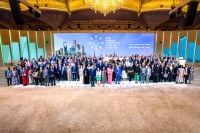
The Riyadh Design Law Treaty is a treaty that establishes a legal framework supporting designers' rights and provides facilities for protecting their creative works. It was adopted by the member states of the World Intellectual Property Organization (WIPO), which includes 193 countries, in Riyadh , the capital of the Kingdom of Saudi Arabia . Adoption of the Riyadh Design Law Treaty The Riyadh Design Law Treaty was adopted during the diplomatic conference on the Design Law Treaty, hosted b...
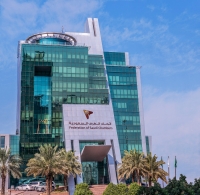
The Federation of Saudi Chambers is concerned with the Saudi business sector and the chambers of commerce, working to support them and represent their interests locally and internationally as an official umbrella in the Kingdom of Saudi Arabia . Among the tasks of the Federation of Saudi Chambers in serving the Saudi economy are: - Internal tasks: The Federation of Saudi Chambers works on conveying the challenges of the private sector to government agencies through a national sectoral committee...
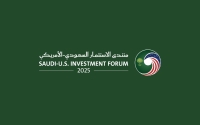
The Saudi-U.S. Investment Forum is an international forum aimed at strengthening joint cooperation between the Kingdom of Saudi Arabia and the United States of America. The forum commenced on May 13, 2025, at the King Abdulaziz International Conference Center in Riyadh , coinciding with President Donald Trump visit to Saudi Arabia as it was the first destination in his foreign visits during his second term. The forum brought together top leaders, decision-makers, and investors with the goal o...
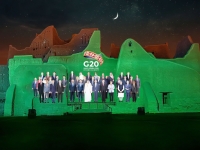
The fifteenth session of the G20 Summit meetings was held on November 21–22, 2020, in Riyadh , due to the Kingdom of Saudi Arabia's pivotal role on regional and global levels, its political and economic stature, as well as the international interest in Saudi Vision 2030 and its prominent role in supporting the global economy and sustainable growth by maintaining stability in global oil markets. The Kingdom adopted the slogan 'let us inspire the world with our summit' after assu...
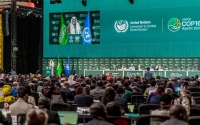
The Conference of the Parties (COP 16) Riyadh is the sixteenth Conference of the Parties to the United Nations Convention to Combat Desertification (UNCCD), held in Riyadh City , Kingdom of Saudi Arabia, from December 2-13, 2024, with the participation of 197 countries worldwide. The conference is concerned with protecting the environment at various levels. COP16 Riyadh marks the first UNCCD conference to be held in the Middle East and North Africa (MENA). Covering an area of approximately four...
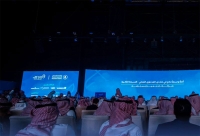
The Local Content Forum 2024 is the second edition of the Local Content Forum, organized by the Local Content and Government Procurement Authority (LCGPA). It represents one of LCGPA’s strategic initiatives. The forum took place in the capital, Riyadh , in the middle of the Kingdom of Saudi Arabia, under the theme 'Partnerships for Sustainable Development ' with participation from both the public and private sectors. It was held from November 20 to 22, 2024. Objectives of the Local ...
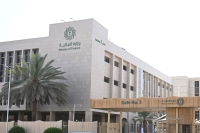
The Kingdom of Saudi Arabia's 2022 Budget is a statement issued by the Ministry of Finance (MOF) in the Kingdom, detailing the state's revenues, expenditures, and the projected surplus for the fiscal year 2022. It was announced on December 12, 2021, with the statement estimating revenues at SAR1,045 billion, approved expenditures at SAR955 billion, and projecting a surplus of SAR90 billion. Priorities of Saudi Arabia's 2022 Budget The Kingdom's 2022 Budget outlined several p...
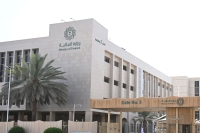
The Kingdom of Saudi Arabia's 2024 Budget is a statement issued by the Ministry of Finance in the Kingdom of Saudi Arabia, detailing the state's revenues, expenditures, and the projected deficit for the fiscal year 2024. It was announced on December 6, 2023. The statement estimated revenues at SAR1,172 billion and approved expenditures at SAR1,251 billion, with a projected deficit of SAR79 billion (representing 1.9 percent of the total gross domestic product (GDP)). Priorities of Saud...
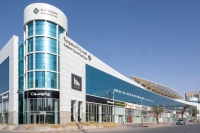
The entity responsible for increasing Saudi Arabia’s non-oil exports is the Saudi Export Development Authority 'Saudi Exports'. It is a government entity tasked with increasing the Kingdom's non-oil exports, opening access to global markets, and utilizing its economic potential. The entity aims to improve the efficiency of the export environment by implementing programs and providing incentives for exporters. The 'Saudi Exports' began its activities in 2013. It works ...
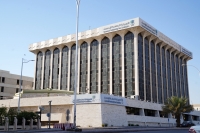
The Household Energy Survey in the Kingdom of Saudi Arabia is an annual field survey conducted to collect accurate and comprehensive statistical data on energy sources, uses, and consumption patterns in the household sector across the Kingdom. It was launched by the General Authority for Statistics to meet the needs of policymakers, data users, and researchers. The first survey was conducted in 2017. Household energy survey process in Saudi Arabia Data related to household energy usage is colle...
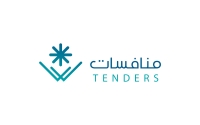
Monafasat Platform is an electronic platform serving entrepreneurs and the institutional sector in the Kingdom of Saudi Arabia . It aims to display statistics, analyze data, and provide access to competitions listed on Etimad Platform . The platform is a key enabler for small and medium enterprises (SMEs), facilitating and ensuring streamlined bidding procedures by offering detailed and integrated services. Operations of the Monafasat Platform Monafasat Platform analyzes government competitions...